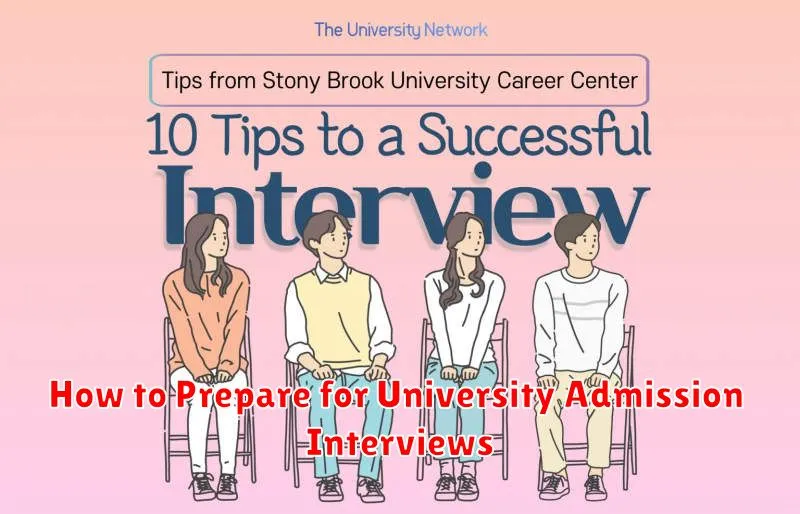Preparing for university admission interviews can be a daunting task. This crucial step in the application process can significantly impact your chances of acceptance. Understanding how to effectively present yourself, articulate your goals, and answer challenging questions is essential. This article provides a comprehensive guide on how to prepare for university admission interviews, covering everything from researching the university and program to practicing your responses and understanding appropriate interview etiquette. Whether you are applying to a highly competitive program or simply want to maximize your chances of a successful university interview, this guide offers invaluable insights and practical tips.
The university admission interview provides an opportunity for applicants to showcase their personality, skills, and experiences beyond what’s presented in their application materials. It allows the admissions committee to assess your fit for the university and program, evaluate your communication skills, and gain a deeper understanding of your motivations. By thoroughly preparing for your university admission interviews, you can confidently navigate this important step and increase your likelihood of securing a place in your desired university and program.
Research the University
Thorough research is crucial before your university admission interview. Understanding the university’s values, programs, and faculty will not only help you answer questions effectively but also demonstrate your genuine interest.
Focus your research on these key areas:
- Academic Programs: Explore the specific program you’re applying to. Understand the curriculum, research opportunities, and faculty expertise. Consider how the program aligns with your academic goals.
- University Values and Mission: Familiarize yourself with the university’s mission statement and core values. Reflect on how your own values and aspirations align with the institution’s.
- Faculty and Research: Identify faculty members whose research interests you. Mentioning their work during the interview can showcase your proactive engagement.
- Student Life and Extracurricular Activities: Research student clubs, organizations, and campus activities. Demonstrating an interest in campus life beyond academics shows you’re considering the holistic university experience.
By conducting thorough research, you will be well-prepared to articulate your reasons for choosing that specific university and program, leaving a positive impression on the interviewer.
Practice Common Interview Questions

Practicing responses to common interview questions is crucial for a successful university admission interview. This preparation allows you to articulate your thoughts clearly and confidently.
Sample Questions:
- “Tell me about yourself.”
- “Why are you interested in this university?”
- “What are your strengths and weaknesses?”
- “What are your career aspirations?”
- “Describe a time you faced a challenge. How did you overcome it?”
Consider crafting concise, thoughtful answers that highlight your relevant experiences and align with the university’s values. Practice delivering these responses aloud, paying attention to your pacing and clarity.
Mock interviews with friends, family, or mentors can provide valuable feedback and help you refine your responses further.
Understand the Program Structure
Before your interview, thoroughly research the program’s structure. Understanding the curriculum, course sequencing, and any specializations offered will demonstrate your genuine interest and preparedness.
Key areas to research include the program’s length, credit requirements, and core courses. Familiarize yourself with the faculty and their research interests, especially if there are professors whose work aligns with your own academic goals. This knowledge can be invaluable during the interview, allowing you to ask insightful questions and articulate how your interests fit within the program.
Knowing the program structure also helps you formulate intelligent questions about potential research opportunities, internships, or study abroad programs associated with the program. This proactive approach showcases your commitment and foresight.
Showcase Your Passion and Goals

University admission interviews offer a valuable opportunity to present yourself beyond academic achievements. Passion and well-defined goals can significantly strengthen your application.
Clearly articulate your academic interests. Explain why you’re drawn to a specific field and how it aligns with your long-term aspirations. Connect your passions to relevant experiences, such as personal projects, extracurricular activities, or volunteer work. This demonstrates genuine enthusiasm and initiative.
Discuss your future goals, both short-term and long-term. How will the university program help you achieve these objectives? Be specific about your career aspirations or desired contributions to your chosen field. This shows you’ve thoughtfully considered your path and how the university fits into it.
Follow Up with a Thank You Note
After your interview, sending a thank you note is a crucial step. It reinforces your interest in the university and shows your appreciation for the interviewer’s time.
Ideally, send your thank you note within 24-48 hours of the interview. Email is generally acceptable, but a handwritten note can leave a more lasting impression. Keep it concise and reiterate your enthusiasm for the program.
Briefly mention something specific you discussed during the interview to personalize the message. This demonstrates that you were actively engaged and paying attention. Reiterate your key strengths and how they align with the university’s values.
Example:
“Thank you for taking the time to speak with me yesterday about the Computer Science program. I especially enjoyed learning about the research opportunities in Artificial Intelligence. My experience in developing algorithms aligns perfectly with the program’s focus on innovative technology. I’m very enthusiastic about the prospect of attending [University Name].”

